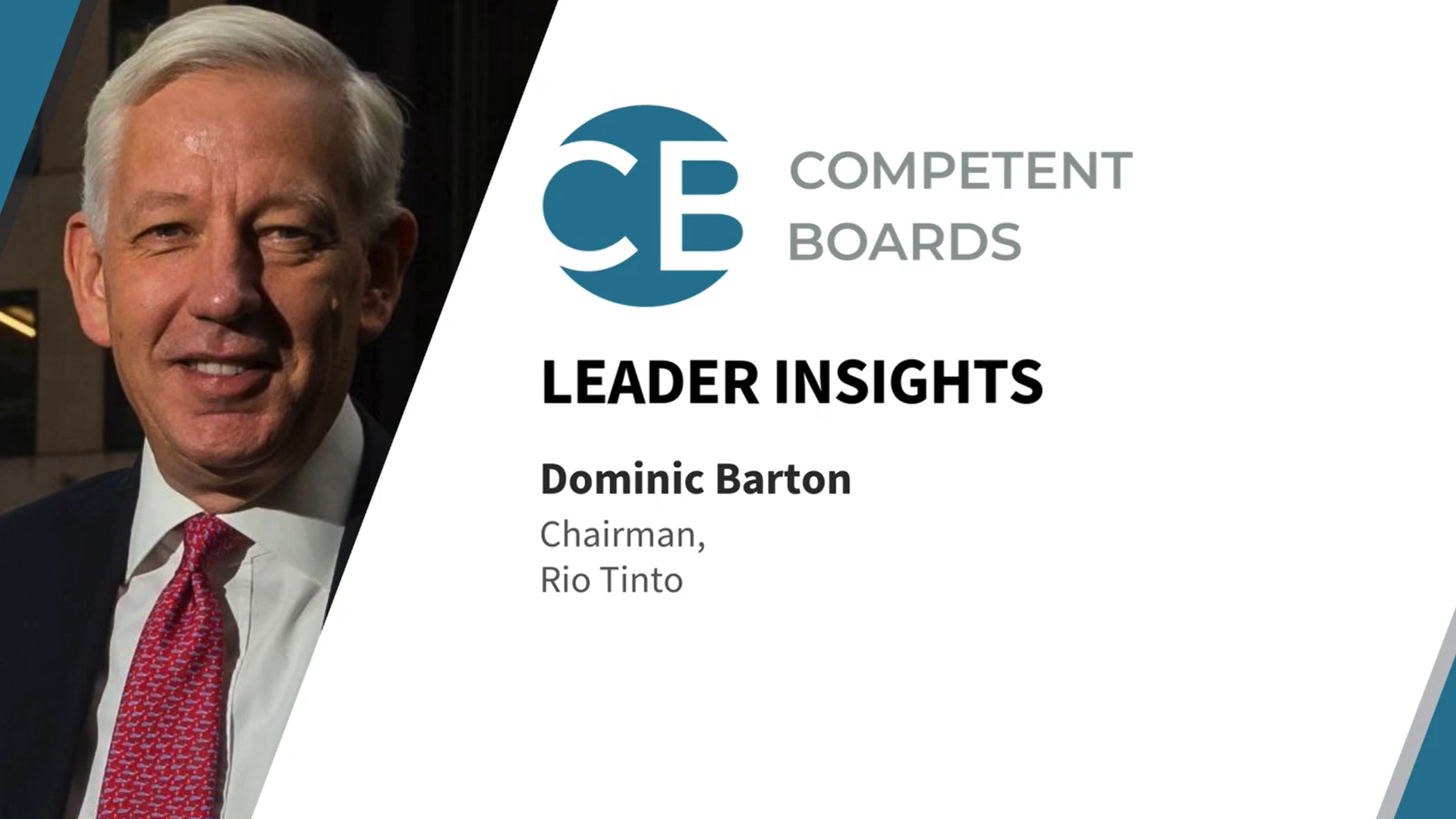
Join Helle Bank Jorgensen, Founder and CEO of Competent Boards, as she hosts an exclusive interview with Dominic Barton, Chairman at Rio Tinto, to explore the future of governance and leadership.
This insightful conversation emphasizes the need for bold, long-term leadership and reimagined governance to address the intertwined challenges of climate change, energy transition, and technological modernization.
Here are some of the takeaways from the discussion:
How can corporate leaders effectively navigate the challenges of decarbonization and energy transition?
- We are at a pivotal moment where corporate leadership must shift focus to accelerate clean energy innovation and prepare for the long-term. It’s essential that we rethink how companies invest and strategize to ensure they are contributing to a sustainable future, not just reacting to the present.
- We need to drive investment into cutting-edge clean energy technologies like hydrogen and nuclear fusion, while fostering collaborations with academia, startups, and other forward-thinking organizations. This isn’t just about incremental improvements; it’s about opening doors to transformative solutions that will shape the next two decades.
- Capital allocation must be aligned with future-focused areas essential for decarbonization, moving away from outdated operations that no longer serve the world we are building. Leaders should be thinking in terms of 10-20 years, prioritizing long-term energy solutions over short-term gains.
- Effective communication and engagement are key. Companies must be transparent with shareholders, employees, and all stakeholders, clearly outlining the roadmap for energy transition. It’s about building trust by openly addressing the trade-offs and challenges, rather than glossing over them.
- Corporate leaders must also advocate for stable, long-term regulatory frameworks that support the energy transition, even when political environments are volatile. It’s vital to work hand-in-hand with policymakers to ensure that the necessary structures are in place for meaningful progress.
- Just as important is recognizing the wider societal impacts of decarbonization. The energy transition must be equitable, particularly for vulnerable communities. The role of leadership is not just to ensure profitability but to contribute to a fair, just transition that benefits all –
“This moment calls for bold, long-term leadership. It’s about having the courage to rethink corporate governance and strategies to meet the complex challenges of decarbonization, while ensuring a sustainable, equitable future for generations to come.”
What are the key societal issues that must be addressed to maintain stability and cohesion during the climate change transition?
- We are in a critical period where addressing the disproportionate impact of climate change on vulnerable populations must be a priority. Regions like Southeast Asia are already facing rising sea levels, droughts, and famine. It is essential to ensure a just and equitable transition that leaves no one behind.
- We must also anticipate and mitigate the growing risks of migration and conflict driven by climate-related disruptions to food, water, and livelihoods. This will be especially important in developing regions where instability could escalate without coordinated action.
- Rebuilding social capital and cohesion is crucial. Societies have become increasingly fractured and polarized, which undermines the collective action needed to combat climate change. We have to focus on reuniting communities and fostering collaboration.
- New policy frameworks and global governance models need to be developed to effectively address the complex, interconnected challenges of climate change, energy transition, and societal stability. Existing systems need to evolve to meet the demands of a rapidly changing world.
- Encouraging and supporting new ideas, thinking, and leadership from diverse voices is key. Younger generations and academics should be at the forefront, contributing to the reimagining of our institutions and approaches. Fresh perspectives will drive the innovation needed for lasting change.
- Improving communication and engagement across businesses, governments, and civil society is non-negotiable. Building trust and alignment around long-term, sustainable solutions will create the shared sense of purpose necessary to navigate the climate transition.
- Ultimately, this transition is not just about technical or economic changes—it’s about maintaining societal stability and cohesion. A holistic, collaborative approach across all sectors is essential if we are to succeed in facing this global challenge.
What new approaches to global governance and leadership are needed to address long-term challenges like technology, energy, and modernization?
- To tackle long-term challenges like technology, energy, and modernization, we must rethink and modernize global institutions, ensuring they remain relevant and effective for the future. This includes bringing in new and diverse voices, particularly younger leaders (aged 35-40), who can provide fresh insights and ideas for reimagining global governance.
- Leadership models and succession planning should be developed with an emphasis on skills and mindsets capable of navigating complex and rapidly evolving environments. To drive these priorities forward, communication and engagement with all stakeholders—markets, shareholders, employees, and society—must be strengthened.
- The key is to move beyond incremental change, having the courage to rethink leadership and governance approaches to meet the significant challenges posed by technology, energy transition, and societal modernization. This demands bold, forward-looking leadership and a commitment to building systems that are resilient for the long-term.